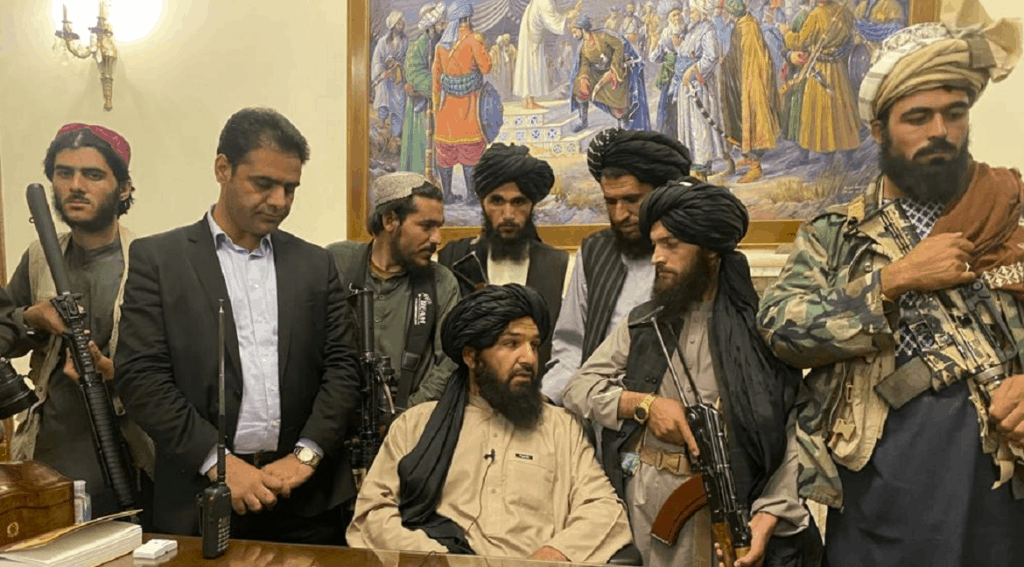By Ali Abbas and Rehna Gul
The presence of foreign military forces in Afghanistan further deteriorated the hanging security conditions in the region. Everyone has witnessed the reaction of invasion and it was also expected and predictable for a state that was never colonized in the history.
The war is not a solution as many political leaders said, even the Afghan army trained by the United States were not able to sustained, and collapsed immediately. Actually, the imposition of foreign values in a society where acceptance level is almost below ten percent remains a fantasy. Any occupation could not sustain and the end is a certain reality and should be recognized.
Actually, the Afghan Taliban has been recognized as Religious-Political entity by the United States during Doha negotiations, and later on Taliban also gained the green signals from China, Russia, and Pakistan and to some extent Iran and Turkey, possibly conditional recognition from United Kingdom as well. Furthermore, the Taliban should rectitude and honor to their assurances and commitments to respect the human rights and adopt a more moderate position and outlook.
The Afghan soil must not use against any other nations, especially the neighboring countries are too sensitive about it. Now the foreign economic aid is not expected hence the Taliban should realize the importance of economic stability and economic integration with other nations in the current competitive world. Past is a witness that the politics of marginalization and intolerance did not last long.
The Taliban need to hear and learn from this and be obliged to shape the future political system of Afghanistan. In this regard, Pakistan can also play role of mediator among all Afghan stakeholders in order to the establishment of an inclusive political system in the country. The single ideology, or faction rule cannot be durable and stable. With the presence of diverse and significant numerous religious and ethnic groups no single group or faction can rule and maintain stable and peaceful Afghanistan. First of all, the Taliban faction has to recognize the diversified society of Afghanistan. At the moment, the cleverest strategy for the Taliban is to secure the recognition of global community and international organizations. The immediate establishment of an inclusive government, including all ethnic and religious groups and factions within the country.
The most important is to dealing with other nations as well as to maintain stability within the country. The earlier government in Afghanistan was mired in strategic ineffectiveness and followed their shortsighted political gains, as a result, the ordinary people of Afghanistan has been suffered. If something is not done soon for peace and stability, there will be more losses in Afghanistan due to poor security situation and economic crisis. It also requires to be confirmed that there needs to be the establishment of a system where a political balance materializes.
Afghanistan is country heavily depended on foreign aid, now it can be sustained through cross border trade smartly. Taliban faces the challenge of assimilating institutions, infrastructure development, and human resources and establish good governance. Effective mechanisms shall have to be emplaced to evade the country’s degeneration into conflict, Taliban cannot afford to pursue peace through another war.
The Afghan dilemma, the price of chaos tolerated by the people of Afghanistan is frequently overlooked. Social, and financial complications of a depression in Afghanistan may spill over to the neighbourhood. Ordinary people just want a normal and balance life. The Taliban have so far implemented non-aggressive policies, and therefore by far the changeover progression has been relatively smooth.
The Taliban have assured that they will not resort to any sort of violence in fear that they will lose the support and recognition that the group has severely requires from the global community to legitimize their rule and government even if it is within the perspective of an inclusive system. That why the Taliban have been holding consultations with main Afghan stakeholders.
The current Afghan dilemma must be seen as a collective and common obligation which involves the establishmenand and safeguarding of an inclusive political system that is satisfactory and acceptable to all. The Taliban must be mindful that global legitimacy needs to be earned. The advancement of trade would suitable well into any approach to shape a better Afghanistan. Trade is depending on the internal peace, stability, and collaboration of neighbouring Countries. Past history is full with realistic indications to propose that well cross-border economic integration and interdependency has decreased conflict.
Regional plate-forums such as ASEAN that are constructed around such endeavours, proportionately growth the desire for sustaining collaboration and confirming stable relationships. In sum, the Taliban must proceed a new and sustainable method to draw out the mainstreaming of Afghanistan regionally as well as globally. This can be a healthy for sustainable development in Afghanistan and collaborative mechanisms with other Countries. The peace and stability in Afghanistan and the region will rest on it.
ALI ABBAS – PhD Scholar at the School of Politics and International Studies, Central China Normal University. PRC China.
REHNA GUL – PhD Scholar at the School of Law, Zhongnan University of Economic & Law. PRC, China.
Image Credit: AP Photo/Zabi Karimi







